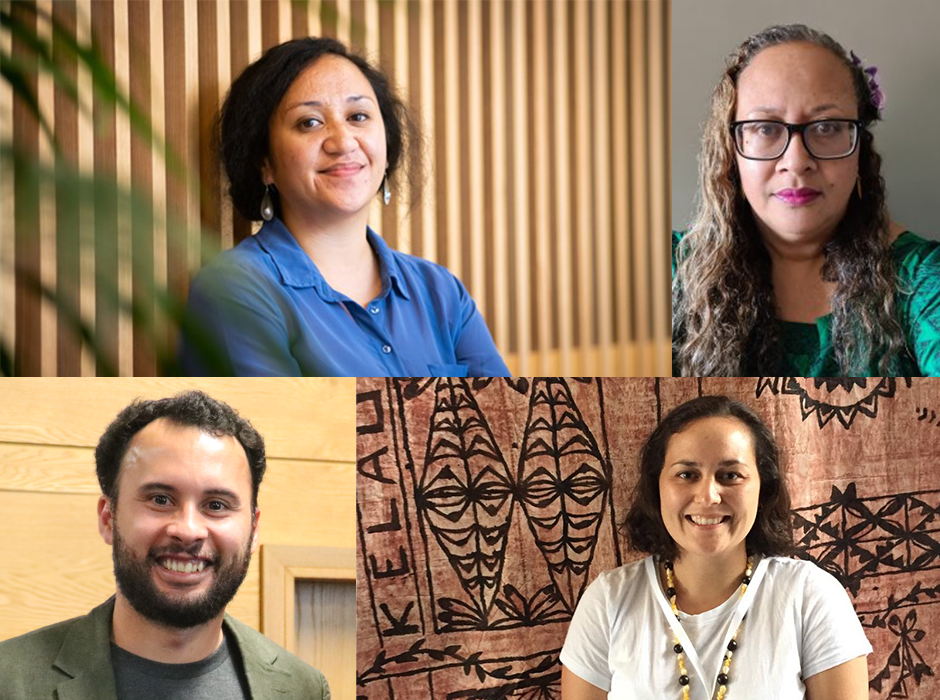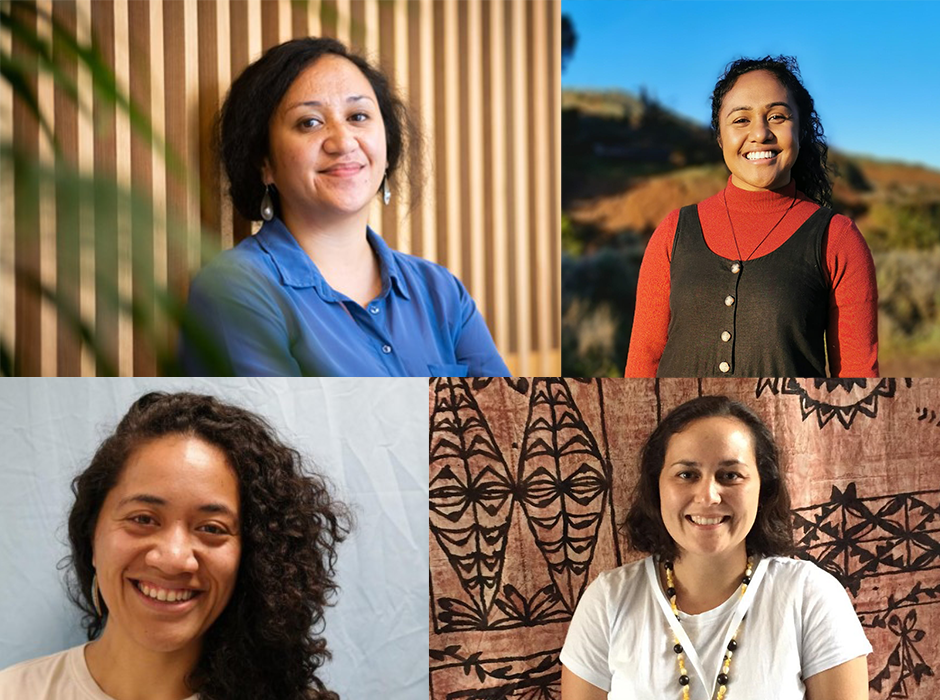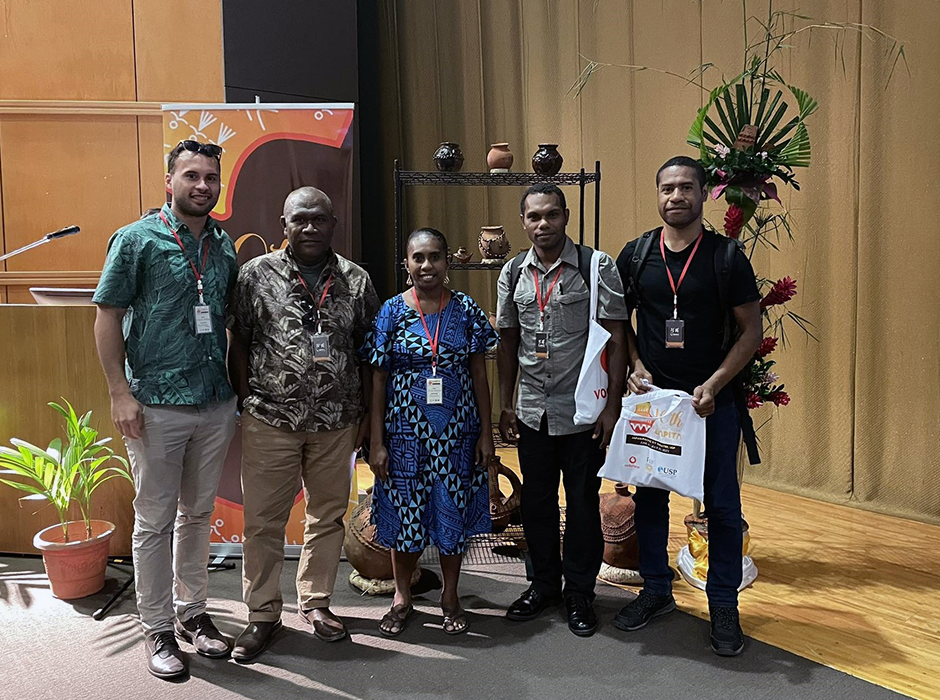
Te Kete Aronui Division of Humanities staff leading research projects supported by the Pacific Academic Staff Caucus are, clockwise from left, Dr Emma Powell, Dr Michelle Schaaf, Dr Jess Pasisi and Dr Charles Radclyffe.
Three research projects led by Pacific staff in Te Kete Aronui – Division of Humanities have been awarded Advancing Research Collaboration Grants from the Pacific Academic Staff Caucus.
In this article, we share more on the project of Dr Emma Powell and Dr Jess Pasisi, from Te Tumu - School of Māori, Pacific and Indigenous Studies to develop a podcast to share and celebrate the collaborative work that Pacific women researchers are engaged in.
We also outline a project by Dr Charles Radclyffe, Mātai Whaipara Takata - Archaeology, on fostering collaboration between Melanesians in research who are dispersed across the Pacific.
Dr Michelle Schaaf, a member of Te Tumu and the Associate Dean (Pacific) Humanities, has received a grant for Voices of the Dunedin Catholic Samoan Community (Inc.). We will share more on her project at a future date.

Clockwise from top left, Dr Emma Powell (Te Tumu), Dr Melanie Puka Bean (University of Utah), Dr Jess Pasisi (Te Tumu) and Dr Eliorah Malifa (National University of Samoa/United Nations).
Early career Pacific women in the academy: A podcast
The research project Early career Pacific women in the academy: A podcast aims to document, reflect on, and celebrate the experiences of early career Pacific women who currently work in full-time academic roles within universities across Aotearoa, New Zealand.
The research team is made up of co-Principal Investigators Dr Emma Powell and Dr Jess Pasisi (Te Tumu, University of Otago) and Associate Investigators Dr Eliorah Malifa (National University of Samoa/United Nations) and Dr Melanie Puka Bean (University of Utah).
These early career Pacific women were educated in Aotearoa, Australia, and the United States, and have all graduated with a PhD in the last four years.
“We represent a generation of Pacific women with academic and career development that has been more resourced than at any other time in history and we are a cohort who have been mentored by leading Pacific academics who were often firsts in their departments and fields,” says Dr Powell.
“With cognisance of this, and the challenges that remain before Pacific women, we feel that this project is necessary and timely.”
Their collaborative project is a response to a challenge set by educationalist and fellow Pacific woman Dr Sereana Naepi, and the findings of the Pacific Pay Gap Inquiry that underscored the pay inequity, structural discrimination and racism that Pacific women face in Aotearoa New Zealand.
“We are used to hearing calls to produce Pacific research that identifies solutions to the urgent issues of our time, crises like climate change, mental and physical health, and educational achievement,” says Dr Powell.
“Rarely is there an impetus to consider and take stock of where Pacific research and scholars are at, to celebrate what has been achieved, and to meaningfully document and take lessons from those successes.
“We hope to do some of that celebration, documentation, and reflection work here because we think critical reflection is important for our collective work as Pacific scholars.”
The research team has expertise in story-telling and recording narration. The collected recordings will make up the production of a podcast to show and celebrate the collaborative work that Pacific women researchers are engaged in. They will also be the subject of two research publications.
Listeners will get a sense of why the numbers of Pacific women in academia have been small but are now on the rise and get a chance to understand why the journeys of these women are meaningful to their respective and broader Pacific and intellectual communities.
The research team expect that by recording and sharing these stories, institutions and interlocutors will gain insight into the kinds of labour that Pacific women intellectuals are engaged in.
The team’s analyses will be useful to the University of Otago, sector agencies, and educators and researchers looking to learn from the pedagogies and career pathways of successful Pacific women who are early career researchers.

Dr Charles Radclyffe (at left), with wantok archaeologists (left to right) Lawrence Kiko, Grinta Ale’eke-Bemama and Reubenson Gegeu from Solomon Islands and Jason Kariwiga from Papua New Guinea at the 10th International Lapita Conference held in June in Fiji.
Melanesians in Research: fostering collaboration between wantok researchers dispersed across the Pacific
Dr Charles Radclyffe is a lecturer in Mātai Whaipara Takata - Archaeology. His supported project is Melanesians in Research: fostering collaboration between wantok researchers dispersed across the Pacific.
For Pacific scholars who may be widely dispersed from their home nations and isolated from their peers, building an academic community forms an essential part of fostering collaborative, sustainable and impactful research both within and across universities Dr Radclyffe says.
“As Solomon Islands' first PhD holder in archaeology, I can reflect on my learning and research journey as one that was and continues to be shaped largely by valuable mentorship and support.
“Therefore, a long-term aspiration of this project is to build upon this and develop greater support and opportunities for other up-and-coming Melanesian scholars to connect and thrive in their fields and institutions.”
Wantok researchers are a particular focus of this project (wantok is a Melanesian pidgin term that means ‘speakers of one language’ or ‘one people’). Few networks exist which are dedicated to nurturing Melanesia-centred academic scholarship, collaboration, and mentorship.
Drawing inspiration from previous efforts and research by Associate Professor Kabini Sanga and other pioneering Melanesian scholars, this project aims to build upon this yearning for community.
Dr Radclyffe will travel to two universities to meet and 'tok stori' (a Melanesian form of reciprocal dialogue) with Melanesian scholars. One of these is the Solomon Islands National University located in Dr Radclyffe’s home city of Honiara, Solomon Islands, which is at its early stages of growth as a research university. The other is the University of Hawai'i at Manoa, an internationally recognised and established research institute.
Dr Radclyffe will work alongside the project’s Associate Investigator and fellow Solomon Islander, Assistant Professor of History Joseph Foukona, who is with the University of Hawai’i at Manoa.
They plan to host tok stori workshops targeted at learning from each other's institutions and strengthening partnerships between the three universities.
There is also scope in the future to expand this network to include the University of Papua New Guinea, University of South Pacific (Vanuatu) and other institutes in the region or further abroad with Melanesian scholars.
“Tagio tumas ('thank you very much') Professor Rose Richards and the Pacific Academic Staff Caucus Advancing Research Collaboration panel for supporting this initiative. Acknowledgements also to Professor Patrick Vakaoti, Associate Professor Tim Thomas and Natalie Harfoot who kindly assisted with developing the project,” says Dr Radclyffe.